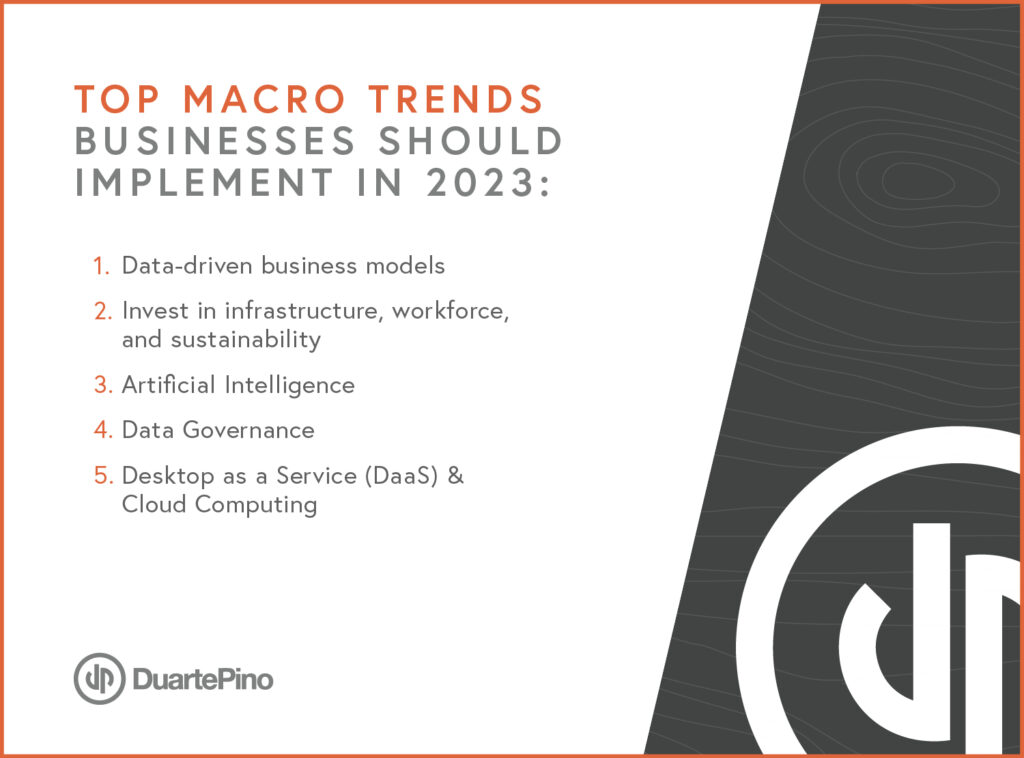A new year is here offering a fresh slate of new possibilities and chances for success. While the last few years have been turbulent and brought a lot of uncertainty, 2023 is the year to be better prepared for anything by increasing your use of smart data and analytics, investing in certain aspects of your business, and staying in tune with the latest technological trends. The world of data, analytics, and technology will never stand still, and when implemented effectively, these tools can help your business stay resilient, optimize growth and keep up in a changing world.
Successfully integrating analytics into your business model will not only lead to an excellent marketing plan execution but also benefit all other aspects of your business’s operations, giving leaders a sure way to establish order, and make more informed decisions. For example, you can expect boosts from determining the efficient allocation of resources in your marketing budget. Additional possible outcomes include providing meaningful insights on internal current trends such as employee attrition in a tight labor market and how to improve processes that generate waste by designing more efficient approaches to daily operations.
Below are some of the top macro trends CEOS should keep up with in 2023:
- Data-driven business models
Data-driven business models in which leaders rely on insightful patterns in their data and analytics to make decisions will increasingly continue to outperform traditional business models. Effectively adopting and implementing the use of analytics within the business decision-making process instead of relying on conventional entrepreneurial intuition, will lead to more resiliency in the face of uncertainty. Even the most polished entrepreneurs are prone to biases; however, market expertise is most effective when paired with insights based on data and an understanding of variables.
- Invest in infrastructure, workforce, and sustainability
Investment in infrastructure (ie. real-time data, machine learning, and cloud services) can capacitate an entire workforce and yield the benefits of effective analytics integration. Therefore, investing in ever-improving technologies that produce the desired results is essential. Moreover, decision-makers must understand that these technologies can be pricey and that results such as a better understanding of customer behavior, product improvement, and streamlining, won’t be seen in the short term but rather in the long run.
What’s more, your marketing and other planning efforts must account for this when managing expectations. An optimal state of data infrastructure implementation is one where this range of data-driven technologies is available to all employees and technical experts on your team. For example, a business operation can capture real-time data on a daily transaction-by-transaction basis, allowing for smarter, faster, and more certain decision-making.
According to research from Gartner: “The priority of workforce issues, such as talent retention, hiring, and diversity, equity and inclusion (DEI), rose substantially for the second year in a row, putting it in a close third place (31%) and significantly ahead of financial issues, such as profitability, cash flow, and capital funding, and the corporate initiatives, such as M&A, strategy change and restructuring.” Therefore, attracting and retaining talent, supporting tech roles, and prioritizing sustainability in remote and hybrid working environments can help and offer room for improvement.
3. Artificial Intelligence (AI)
Technologies such as Machine Learning colloquially referred to as AI, will allow all sorts of automation of repetitive, tedious tasks, from data cleansing and management to even daily marketing tasks or crunching numbers in the financial departments. The success of these workflows will, in the long run, be the main differentiator which determines a business’s success.

- Data Governance
Data governance (DG) is “the process of managing the availability, usability, integrity, and security of the data in enterprise systems, based on internal data standards and policies that also control data usage.” Today, the governance of data is making big ripples with governments worldwide implementing regulating laws for the use of personal and data information.
Furthermore, trends in customer behavior signal a strong preference for products and services that handle personal data in a manner that is transparent and secure for users. Therefore, creating a proper framework for data governance is critical to ensure you have the proper documentation and the right ways of internally processing data. In addition, auditing how and where your data is stored will be extremely beneficial in case of changes or cyber-attacks.
- DaaS (Desktop as a Service) and Cloud Computing
Not all businesses will have the capital to develop these capabilities and lift such an infrastructure. As such, they will need to rely on already established cloud services to store their data and purchase access to collected data to reduce their costs in proprietary data development. According to Statista, by 2023, these services’ value is estimated to grow by over USD$10.7 billion.
Forbes noted, “Basically, it means that companies can access data sources that have been collected and curated by third parties via cloud services on a pay-as-you-go or subscription-based billing model. This reduces the need for companies to build their own expensive, proprietary data collection and storage systems for many types of applications.”
In conclusion, data sciences and analytical trends are more valuable than ever for your business’s survival and growth. Teaching yourself and your employees about these new trends will help develop a stronger foundation for growth and innovation so that your business continues to thrive in the future.
Marketing analytics helps us see how everything plays off of each other to decide how your company may want to invest moving forward. Re-prioritizing how your team spends its time, and the resources, channels, and efforts you invest in, are critical steps to achieving marketing success and improving sales. At DuartePino, our analytics experts analyze your business’ data to evaluate the performance of your marketing, content, and products and use your analytics insights to reach the right people. Contact us to learn what our trust advisors can do for you.
*This blog post was written by Gabriel Negron Melendez, Junior Intelligence Advisor at DuartePino.

